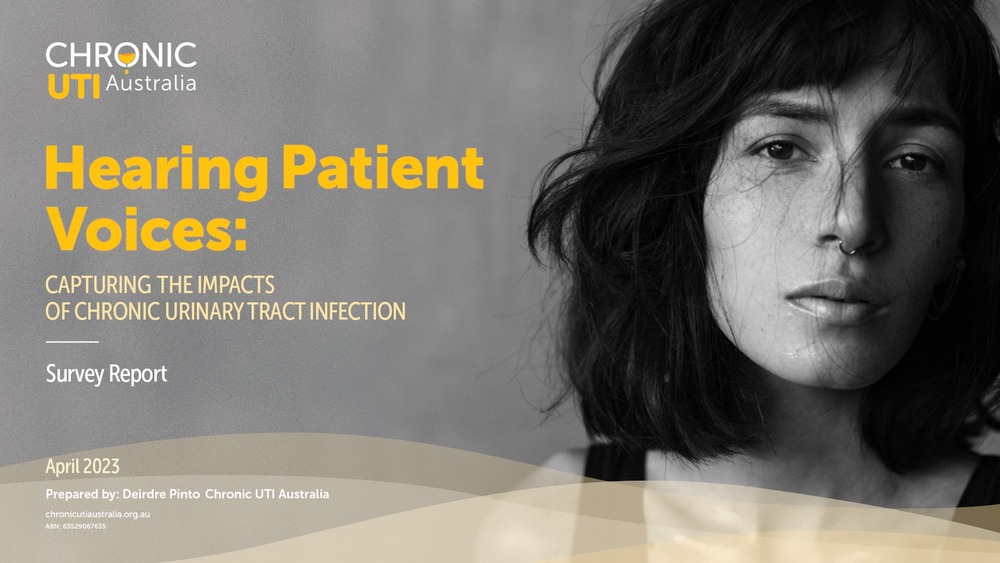
recurrent UTI Tag
Victorian Inquiry Into Women’s Pain
Following a landmark survey dedicated to women's health, in January 2024 the Victorian state government announced it was conducting an inquiry into women's pain. The Inquiry will report on the lived experiences of Victorian girls and women and is expected to provide recommendations to inform improved models of care and service delivery in the state. In July 2024, Chronic UTI Australia made a submission on behalf of women and girls with chronic UTI. You can read it here.
Chronic UTI recognition in UK will help Australian campaign
In 2023 England’s National Health Service (NHS) responded to public pressure by finally recognising chronic urinary tract infection (UTI) as a distinct condition requiring specialist diagnosis and treatment. The development could pave the way for patient advocates in Australia and other countries who are campaigning their own authorities for major improvements to UTI guidelines.
Chronic UTI Survey Report – Hearing Patient Voices
The Hearing Patient Voices project surveyed 410 people from around the world with chronic urinary tract infection (UTI). The online survey measured the impact chronic UTI has on quality-of-life and focused on symptoms, various life domains, emotional wellbeing, healthcare experiences and avoidable costs to the health system. You can read a summary, and download the full Hearing Patient Voices survey report, below.
Carly’s Chronic UTI Story
(Carly's story was updated in October 2024.) Carly was 21 when she had her first UTI. She was treated with antibiotics and a week later her symptoms were back. This pattern continued. Her doctor believed each episode was a new infection but she wasn't so sure. She decided to take to the internet to learn more. She first heard about Hiprex when reading through some chronic UTI websites and decided to buy some and give it a go. After 10 months taking Hiprex daily, along with a three-month trial on antibiotics, she feels completely well and is excited to be planning her wedding.
Chronic UTI Support for Australia & New Zealand
Online information and support groups can be great places to link with others who are in a similar situation. This can help reduce feelings of isolation often experienced by people suffering silently with persistent lower urinary tract symptoms (LUTS). Online groups allow for the sharing of information and personal experiences and are good places to access support—or to support others. We had a chat with the administrators of the Chronic and Recurrent UTI Support Group (Australia and New Zealand)—a Facebook group focused on science-based discussions around diagnosis and treatment for chronic UTI. The group has a strong emphasis on exploring solutions to overcome the challenges of accessing treatment in our region. Online support groups are not for everyone but they can play a helpful role for many people who are seeking information and support.
Chronic UTI and Mental Health
People experiencing chronic pain and illness, like chronic urinary tract infection (UTI), often find their condition has as equally devastating an impact on their mental health as it does on their physical health and well-being. In a society which overwhelmingly focuses on health and ‘good’ health behaviour—you go to the doctor, follow their instructions, and get better—the impacts of having a chronic health condition are often completely unexpected, and rarely discussed.
Australian Interview with Professor James Malone-Lee
We are thrilled to release our 2021 Australian-exclusive interview with Professor James Malone-Lee discussing chronic urinary tract infection (UTI). Professor Malone-Lee has nearly four decades of experience researching UTI and treating thousands of patients with bladder conditions. He shares information from his book Cystitis Unmasked in response to questions from an all-Australian panel featuring urologist Dr Anita Clarke, pelvic physiotherapist Alyssa Tait, chronic UTI patient representative Melinda Brown and Chronic UTI Australia's chairperson, Imelda Wilde. Read more below from Imelda about the interview.
Diane’s Chronic UTI Story
Diane started to get recurrent UTIs several years after surgery for urinary incontinence using transvaginal tape (TVT). The surgery was successful but for a time she needed a catheter to empty her bladder. After a routine colonoscopy and stopping hormone replacement therapy (HRT), a tsunami...










